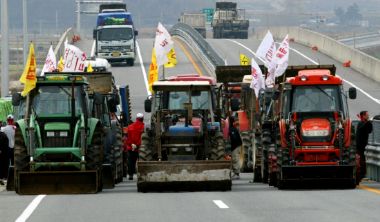|
South Korean parliament approves rice-market liberalization plan
(AP)
Updated: 2005-11-23 14:32
South Korea's parliament on Wednesday approved a plan to liberalize the
domestic rice market, despite angry protests from farmers who say their
livelihoods are in danger of extinction.
The South Korean government agreed to the rice market plan last year after
negotiations with the United States, China, Thailand and six other
rice-producing countries. Under the deal, South Korea must gradually double its
current 4 percent limit on rice imports by 2014, and eventually fully open the
market with tariffs still allowed.
The National Assembly approved the plan in a 139-61 vote, with 23
abstentions. The session convened after a delay caused when lawmakers opposed to
opening the rice market blocked the parliament speaker from reaching the podium.
The lawmakers continued their shouts of protests during the vote.

South Korean farmers block a motorway with
their vehicles during a rally in Changheung, south of Seoul November 23,
2005. [Reuters] | The market-opening plan has sparked demonstrations and been connected to two
suicides in recent weeks by farmers who have railed against pro-globalization
bodies like the World Trade Organization, which they say pursues a U.S.-driven
agenda. They fear cheaper rice from other countries will drive them out of
business.
South Korean Foreign Minister Ban Ki-moon said Wednesday the country would
face imposed tariffs on rice if it doesn't comply with the deal, a step he
warned would "deal a heavy blow to local farming families."
"If South Korea doesn't ratify the rice deal it promised to the international
community, its standing, image and credibility will be undermined," Ban told
reporters.
Farmers have argued vigorously against the plan, also protesting at the Asia
Pacific Economic Cooperation summit last week in the port city of Busan, where
some demonstrators clashed with police.
Kang Ki-kab, a lawmaker with the small opposition Democratic Labor Party, has
been fasting for nearly four weeks in protest _ and said he would refuse food
until his demands are met for farmers to be compensated for their losses.
Wearing traditional Korean robes, he was among those shouting in parliament
Wednesday trying to prevent the vote from going forward.
"We've lost too much, given too much to the U.S.," Kang told The Associated
Press at a protest Tuesday in central Seoul.
Other demonstrations nationwide have included farmers burning sacks of rice
in protest.
The South Korean farmers are also expected to bring their protests to a key
WTO meeting set for next month in Hong Kong, where international trade officials
are seeking to move forward on talks to open markets
worldwide.
|